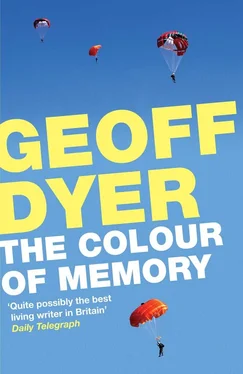‘Steranko,’ I shouted. ‘You sure you wouldn’t rather I just threw you a stick so you could chase after that?’ He grinned back at me. People stopped and watched for a few minutes. Young boys ran to fetch the ball when it bounced out of play. I looked around. The trees around the park were perfectly still as if time had stopped, as if every second of the afternoon were held in a single moment: Steranko frozen in his running, his feet barely touching the grass; Carlton bent down tying his shoe, the breeze rippling his shirt; the muscles straining in someone’s leg; players jumping for the ball, their feet suspended in mid-air, the goalkeeper’s hands rising above their floating hair; the ball hanging over them like a perfect moon. And everything around us: the crease of the corner flag, the wind-sculpted trees, the child’s swing at the top of its arc, the water from the drinking fountain bubbling towards the lips of the woman bent down to drink, the cyclist leaning into the curve of the path, a plane stalled in the sky, someone’s thrown tennis ball a small yellow planet in the distance.
The following week I embarked on a strict régime of spontaneity. It all started with a friend in Amsterdam asking if I wanted to spend a few days there before she moved on to Istanbul. In the event I spent three days changing my mind and dithering about whether or not I could afford the flight. By the time I had finally decided to go there were no cheap flights available. As soon as it became clear that I couldn’t go my desire to be in Amsterdam became almost overwhelming. I phoned back the travel agency and said I would take a slightly more expensive kind of ticket but by that time the only available tickets were for ambassador class with free champagne. The ferry was also out of the question: I would have arrived about twelve hours before my friend left. I called her, said I couldn’t make it and wished her luck in Istanbul. I put the phone down and after careful consideration decided that I needed to be more impulsive. The first thing I did was buy a pair of badly-fitting brogues from a store in Camberwell. Fifteen minutes after buying them my feet felt like they were wrapped in barbed wire. Undeterred, I resolved that whatever I felt like on the spur of the moment I would do. From now on I was going to live for the moment. I even looked forward to finding opportunities in which I could exercise my spontaneity.
A couple of days later I impulsively went along to a party and spontaneously slurped five or six cans of Shaftmeister Pils. Soon after that I got into some kind of ridiculous argument with a guy of about my age and build. Things got surprisingly heated. This other guy looked pretty feeble and after a couple of minutes arguing I asked him what his problem was. He told me to go fuck myself.
‘Listen, there are two ways we can do this,’ I said. ‘Take it from me, this is the easiest.’
I wanted it to sound full of dangerous calm and neurasthenic menace but it actually came out sounding improbable — like a film buff quoting from a movie — and inappropriate (partly because such a declaration had no logical connection with what had gone before). The guy looked at me. I tried him with an I know I’m tough and I hope for your sake I’m not going to have to prove it look. He responded with a Shit, it’s boring having to get into these things so we’d better get it over with glare.
I gave him back one of the same, an OK if that’s the way you want it . He responded with a Right here it comes ; I gave him my Right now you’re really going to reap the whirlwind . Privately I was thinking exactly the opposite: Wrong, now I’m going to reap the whirlwind . Neither of us moved a muscle. Tense seconds passed and I realised with great relief that the other guy had no more intention of fighting than I did. Eventually he shook his head and departed with a You’re not even worth the trouble and I just had time to get in a quick Lucky for you, mother-fucker before he walked off. All in all it was a completely satisfactory encounter, a harmless battle of facial rhetoric — all the thrills and spills of real fighting without any of the pain. Basically we were just two drunk guys who wanted to act tough for a couple of minutes. I bumped into him at the party a few minutes later and we had quite a laugh about it.
A few minutes later somebody offered me a lift back to Brixton. Impulsively and happily I said yes and for the next half an hour I quivered in the back seat of a car with two other passengers while the driver, roaring drunk and sipping Sapporo, squealed around corners and kamikazied his way through the red lights of east and south London. Every couple of seconds I had a precise and frightening vision of a head-on collision, of getting oxy-acetylened out of the wreckage and coming round in hospital a week later while a doctor patiently explained that I was going to have to spend the rest of my life in a brain-damaged wheelchair. I got out of the car about a mile from home and walked the rest of the way, relieved to feel the blood pumping through the muscles of my still intact legs.
Waking up the next morning with the odd sensation of being surprised to be alive I threw recklessness to the wind and abandoned my spontaneity programme then and there. I was fed up with the rigours of impulsive living anyway: I didn’t have the application for it. I couldn’t cope with being stoned at eleven thirty in the morning and that kind of thing. Spontaneity seemed constantly to tow regret in its wake. Living for the moment was all very well, I decided, but you had to pick your moments carefully. Quite often there was another moment just around the corner which was much more worth living for than the one you were engaged in.
The phone rang. I picked it up semi-spontaneously. It was Fran.
‘Hi! How’s things?’
‘Good. How are you?’
‘Fine. Listen,’ I said. ‘Dad phoned the other day. He said he’d been trying your number for a week and no one knew where you were.’
‘I’ve been all over the place. OK, I’ll phone him. How are you though? I haven’t seen you for ages.’
We talked for a few more moments like that (neither of us really knew how to chat on the phone) and then arranged to meet.
Fran, I reflected when we’d hung up, was much better suited to the spontaneous lifestyle than me. She had a knack for avoiding the consequences of things. Or rather, like Steranko, she was at ease with the consequences of things. When we were on holiday with our parents we would go swimming together and afterwards I would always want to get dry fast and change out of my wet trunks; Fran, on the other hand, would be happy to build sandcastles or go for a walk along the cliffs in her wet costume, letting the sun and the wind dry her off. And still, as an adult, she managed to inhabit a world of action and gesture rarely seen outside the cinema, where people walk through streams without taking their boots off, or rush out into the pouring rain wearing only a shirt, or throw plates at their lover across the room in a fit of passionate rage. I’d love to do all those things — but in real life you always have to get your boots dry, or wake up with a cold, or sweep up the broken pieces and fork out for new crockery. It’s the same with fighting: afterwards you have to hang around the hospital for three hours waiting to get your nose X-rayed and straightened, or you’ve got to take your best suit to the dry cleaners to get the blood out and the lapel stitched back on. In the cinema there are only the large consequences of plot; the mess is cleared up off-screen by stage hands; even a real trouncing leaves only a few cosmetic scars.
In cinema or books the climax of the action, however calamitous, simplifies and resolves — brings things to an end. In real life calamity and confrontation always bring chores in their wake. There are keys to return, bills to pay, the milk to cancel, people to tell and arrangements to make. It’s like Othello. Two minutes after murdering Desdemona he’s expecting earthquakes and eclipses and all he gets is the neighbours banging on the door wanting to know what all the noise is about. Or like a friend of mine who was stabbed and got his dole money stopped because he missed his signing-on day and hadn’t filled out a sickness form while he was on a life-support machine.
Читать дальше












